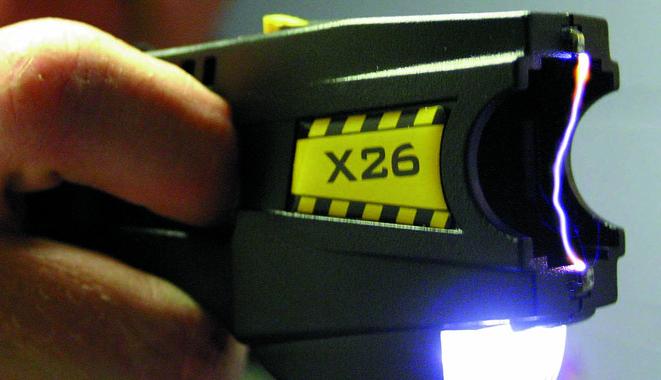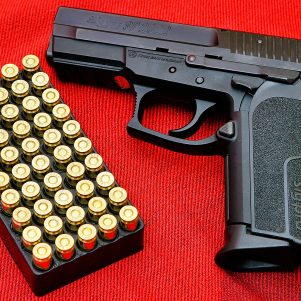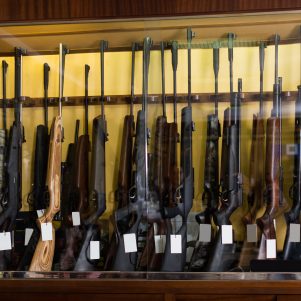Massachusetts High Court Retreats On Stun Gun Ban
By Evan Lips | April 17, 2018, 16:12 EDT
 A Taser electro-shock weapon issued to many police agencies is a type of stun gun. (Photo via Wikipedia, courtesy of Gun News Daily, at https://gunnewsdaily.com/.)
A Taser electro-shock weapon issued to many police agencies is a type of stun gun. (Photo via Wikipedia, courtesy of Gun News Daily, at https://gunnewsdaily.com/.)
BOSTON — The state’s highest court retreated on Tuesday from its long-held stance that a Massachusetts statute banning civilian possession of stun guns is not unconstitutional, marking a rare win for the commonwealth’s right-to-bear-arms activists.
Tuesday’s decision reflects a March 2016 United States Supreme Court ruling stemming from an appeal filed by a Massachusetts woman named Jaime Caetano, who was charged with a crime by the state after she used a stun gun to ward off an attack from an ex-boyfriend. U.S. Supreme Court Justice Samuel Alito in his concurring opinion noted that “Caetano’s mere possession of the stun gun that may have saved her life made her a criminal” in Massachusetts.
A Massachusetts law first enacted in 1986 holds that “no person shall possess a portable device or weapon from which an electrical current, impulse, wave or beam may be directed, which current, wave or beam is designed to incapacitate temporarily, injure or kill.”
The law was amended, however, in 2004 to allow police to use the devices, while civilians currently face prison sentences of between six months and two-and-a-half years and fines between $500 and $1,000.
“A law enforcement officer may arrest without a warrant any person whom he has probable cause to believe has violated this section,” the law specifies.
Tuesday’s ruling did not stem from Caetano’s case. Rather, the case involved a man named Jorge Ramirez who was found to be in possession of a stun gun during a traffic stop conducted by police in Revere.
Massachusetts Supreme Judicial Court Justice Ralph Gants acknowledged in the decision that the U.S. Supreme Court had shredded the SJC’s previous ruling citing a Washington D.C. firearms ban.
Gants recalled that while the state’s highest court previously held that a stun gun ban “did not violate the Second Amendment right to bear arms, as interpreted by District of Columbia v. Heller,” the U.S. Supreme Court, “in a brief per curiam opinion, concluded that each of the three explanations we offered to support this holding were inconsistent with propositions stated in Heller, and therefore vacated the judgment and remanded the case for further proceedings.”
Regarding Ramirez’s attempt to cite the U.S. Supreme Court’s ruling regarding the Massachusetts stun gun ban, Gants wrote that a Chelsea District Court judge “denied the motion without explanation, and also denied the defendant’s request for written findings of fact and rulings of law.”
Meanwhile, while weighing Caetano’s appeal, the Supreme Judicial Court in 2015 claimed that her case “falls outside the ‘core’ of the Second Amendment, insofar as the defendant was not using the stun gun to defend herself in her home, and involves a ‘dangerous and unusual weapon’ that was not ‘in common use at the time’ of enactment” of the Second Amendment.
On Tuesday, Gants wrote that the U.S. Supreme Court’s “guidance” in the Caetano case has prompted the state Supreme Judicial Court to “conclude that ‘stun guns’ are ‘arms’ within the protection of the Second Amendment.”
“The absolute prohibition that bars all civilians from possessing or carrying stun guns, even in their home, is inconsistent with the Second Amendment and is therefore unconstitutional,” Gants wrote.
The Massachusetts high court’s ruling does not legalize stun guns overnight — instead, it will be up to the state Legislature to draft a new law regulating their usage.
Per Gants:
“Because this will invalidate the Legislature’s absolute ban and leave no lesser restriction on the possession of stun guns in its place, and because we recognize that the Legislature may wish to do what we cannot (revise the statute in a manner that will preserve its constitutionality), we will direct that the entry of the judgment after the date of our issuance of the rescript in this case be delayed in order to allow the Legislature adequate time to amend the statute in light of this opinion, if it so chooses.”
Lawmakers, according to the decision, have 60 days to enact a set of stun gun possession regulations.
A spokesman for House Speaker Robert DeLeo confirmed Tuesday to State House News Service that a bill will be drafted within the requested timeframe.
[Editor’s Note: The photo of a stun gun that accompanies this story comes from Gun News Daily.)
Read the SJC ruling:
2018-04-17 SJC Stun Guns by Evan on Scribd











